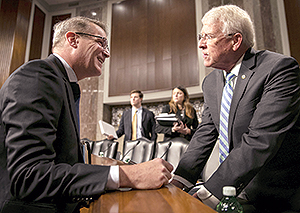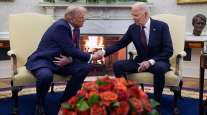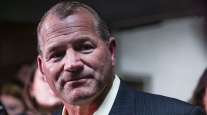Senior Reporter
ATA President Chris Spear Urges Senate Panel to Fund Infrastructure Projects Long Term

WASHINGTON — Sustainable funding for construction and maintenance of large-scale infrastructure projects nationwide is needed to address wasted economic productivity from traffic congestion and the potential harm older structures pose to drivers, the top executive of American Trucking Associations told a Senate committee Feb. 13.
“Our roads and bridges are literally crumbling,” ATA President Chris Spear said during testimony before the Senate Commerce Committee, delivering a call to action to lawmakers for a long-term infrastructure measure. “We’re no longer facing a future of highway maintenance crisis. We’re living in it. And every day we fail to invest, we’re putting more lives at risk. … Truck drivers are on the front lines. Each day, they see potholes getting deeper, bridges getting weaker,” he said.
CAPITOL AGENDA: Check out the Infrastructure Meter and Ray LaHood's ideas
Spear suggested transportation policymakers consider ATA’s Build America Fund proposal to ensure funding for the dwindling federal Highway Trust Fund, which analysts estimate will require supplemental funding by 2021 to remain operational.
The Build America Fund, Spear explained, would be backed by a 20-cent-per-gallon fee incorporated into the price of transportation fuels gathered at the terminal rack at 5 cents per year over four years. This fee would be indexed to inflation as well as improvements in fuel efficiency with a 5% annual cap. During its first decade, Spear said, the program would be capable of generating about $340 billion.
Leaders from the freight rail and commercial ports associations echoed Spear’s sense of urgency, and noted their endorsement of an immediate increase in the federal fuel tax.
REPLAY: Watch a video of the hearing at commerce.senate.gov
“Because seaports have such a national and international reach, ports are national infrastructure resources that support metropolitan and rural supply chains and that any port project awarded should not count against a state, rural or metropolitan cap,” said William Friedman, chairman of the American Association of Port Authorities. “Long-term, sustainable multimodal funding is critical, and we encourage you to start looking at solutions.”
Transportation policymakers on Capitol Hill have yet to outline their legislative vision for infrastructure legislation, but Committee Chairman Roger Wicker (R-Miss.) raised with Spear the viability of public-private partnerships as a source of funding. The Trump administration has touted P3s as a potential method of paying for upgrades to roads and bridges, but Spear said they don’t address mainstream needs.

Spear (left) speaks with Wicker after the hearing. (Al Drago/Bloomberg News)
“I would argue that, from the context of roads and bridges and from a trucking perspective, P3s are code for tolling,” Spear said. “Tolling is only profitable when you have a high throughput.”
ATA also would support a fee on hybrid and electric vehicles, Spear said in written comments.
Wicker acknowledged the need to proceed with a comprehensive approach aimed at improving transportation connectivity.
“What was once the envy of the world, our infrastructure system has fallen behind on what is required to maintain America’s competitiveness in a global market,” Wicker said. “The American Society of Civil Engineers report card gives our infrastructure a grade of ‘D+.’ Our ports are congested. Millions continue to be without access to high-speed internet. Americans spend 8 billion hours stuck in traffic each year.”
Committee ranking Democrat Sen. Maria Cantwell of Washington advocated for her caucus’s $1 trillion infrastructure plan unveiled during the previous session of Congress, which Republican leaders ignored.
“What I think we need to do — my colleagues on this side of the aisle put forth an infrastructure proposal — [is] really try to focus on the [return on investment] that we get from infrastructure investment. Whether that is aviation, maritime, broadband, or things as basic as grid modernization, are about transforming our community and using the resources of our cherished infrastructure investment in the appropriate ways,” Cantwell said.
ATA President Chris Spear O... by on Scribd
House Transportation Chairman Peter DeFazio (D-Ore.), who convened a hearing with UPS Freight president Rich McArdle and other transportation executives on Feb. 7 to examine a path forward on infrastructure funding, has indicated he plans to unveil legislation this summer.
“The question is not whether we will need to invest, but when we will invest,” DeFazio said. “Every day that we ignore our ballooning infrastructure deficit, the problem becomes more expensive to fix and more pronounced.”
In the State of the Union address this month, President Donald Trump expressed support for Congress’ upcoming work on infrastructure policy. The president’s 10-year, $1.5 trillion infrastructure plan unveiled last year relied heavily on private investment and failed to gain support on Capitol Hill.
The dwindling Highway Trust Fund, which assists states with maintenance projects, relies on revenue from the 24.4-cents-per-gallon diesel tax, and 18.4-cents-per-gallon gas tax. The tax has remained the same since 1993.
The American Transportation Research Institute determined that in 2016 congestion led to an annual cost to the trucking industry of $74.5 billion. Additionally, it concluded truckers sat in traffic for nearly 1.2 billion hours, or the equivalent of about 425,000 drivers sitting idle in a year.




